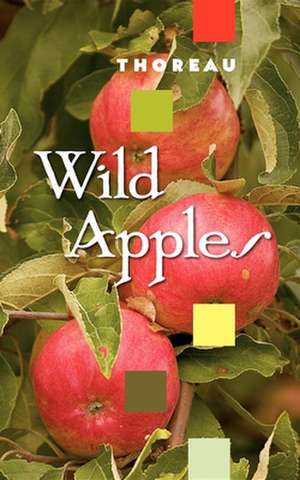Wild Apples
Autor Henry David Thoreauen Limba Engleză Paperback – 31 oct 1989
"Wild Apples" begins with a short history of the apple tree, tracing its path from ancient Greece to America. Thoreau saw the apple as a perfect mirror of man and eloquently lamented where they both were heading.
| Toate formatele și edițiile | Preț | Express |
|---|---|---|
| Paperback (11) | 43.72 lei 3-5 săpt. | |
| CREATESPACE – | 43.72 lei 3-5 săpt. | |
| CreateSpace Independent Publishing Platform – | 43.91 lei 3-5 săpt. | |
| Applewood Books – 31 oct 1989 | 61.92 lei 3-5 săpt. | |
| CREATESPACE – | 62.56 lei 3-5 săpt. | |
| CREATESPACE – | 63.38 lei 3-5 săpt. | |
| CREATESPACE – | 80.92 lei 3-5 săpt. | |
| CreateSpace Independent Publishing Platform – 26 noi 2015 | 114.48 lei 3-5 săpt. | |
| – | 45.66 lei 6-8 săpt. | |
| Binker North – 10 iun 2023 | 61.70 lei 6-8 săpt. | |
| Book Jungle – 7 oct 2009 | 80.69 lei 6-8 săpt. | |
| CreateSpace Independent Publishing Platform – | 100.20 lei 6-8 săpt. |
Preț: 61.92 lei
Nou
Puncte Express: 93
Preț estimativ în valută:
11.85€ • 12.88$ • 9.96£
11.85€ • 12.88$ • 9.96£
Carte disponibilă
Livrare economică 31 martie-14 aprilie
Preluare comenzi: 021 569.72.76
Specificații
ISBN-13: 9781557091307
ISBN-10: 1557091307
Pagini: 48
Dimensiuni: 128 x 208 x 3 mm
Greutate: 0.06 kg
Ediția:Reprint
Editura: Applewood Books
ISBN-10: 1557091307
Pagini: 48
Dimensiuni: 128 x 208 x 3 mm
Greutate: 0.06 kg
Ediția:Reprint
Editura: Applewood Books
Descriere
A meditation on apples begins with a short history of the apple tree, tracing its path from ancient Greece to America. Thoreau saw the apple as a perfect mirror of man and eloquently lamented where they both were heading.
Notă biografică
Henry David Thoreau (July 12, 1817 - May 6, 1862) was an American naturalist, essayist, poet, and philosopher. A leading transcendentalist, he is best known for his book Walden, a reflection upon simple living in natural surroundings, and his essay "Civil Disobedience" (originally published as "Resistance to Civil Government"), an argument for disobedience to an unjust state.Thoreau's books, articles, essays, journals, and poetry amount to more than 20 volumes. Among his lasting contributions are his writings on natural history and philosophy, in which he anticipated the methods and findings of ecology and environmental history, two sources of modern-day environmentalism. His literary style interweaves close observation of nature, personal experience, pointed rhetoric, symbolic meanings, and historical lore, while displaying a poetic sensibility, philosophical austerity, and attention to practical detail.[5] He was also deeply interested in the idea of survival in the face of hostile elements, historical change, and natural decay; at the same time he advocated abandoning waste and illusion in order to discover life's true essential needs.Thoreau was a lifelong abolitionist, delivering lectures that attacked the fugitive slave law while praising the writings of Wendell Phillips and defending the abolitionist John Brown. Thoreau's philosophy of civil disobedience later influenced the political thoughts and actions of such notable figures as Leo Tolstoy, Mahatma Gandhi, and Martin Luther King Jr.
